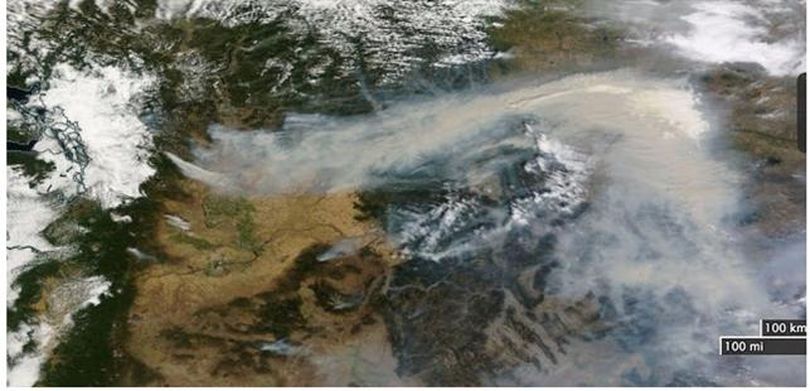Idaho confirms fire danger won’t change hunting season dates

HUNTING -- As early hunting seasons are starting to open, everybody's puckered up about the wildfires that are burning in the region and the dry conditions vulnerable to even more blowups.
Rightfully so.
But the calls to curtail hunting seasons are not reasonable. Access closures will be severely restricting seasons as it is (story coming Thursday). States have set season dates based on numerous factors and changing them causes a domino effect of problems and conflicts for hunters, businesses, agencies and wildlife.
Idaho Fish and Game has heard the rumors about hunting season changes. Here's a just-posted media release expressing the agency's position:
Fires limiting access to some areas, but hunting seasons will go on
Hunters heading into the field need to beware of fire situations and possible area closures in their favorite hunting spots. They can get fire information and links to other websites at a designated fire page on Idaho Fish and Game’s website
Typically, fire season is waning when fall hunts begin, which could happen in parts of the state, but weather patterns in the Panhandle and Clearwater Basin are showing no relief from fires. Access to some areas, including federal, state and private timberlands, is closed, and hunters can expect some access restrictions in those regions.
“I think the message to folks is this is not a typical fire year,” said Jason Kirchner, public affairs officer for the Panhandle National Forest. “There are going to be some areas closed all the way into winter. When the fires are out, those closures will shrink, but not disappear.”
Forest Service officials reported North Idaho has about 70 fires burning - the most since 1926 - and people concerned about their hunting spots should check the fire page on Fish and Game’s website for updates and conditions.
- Get recorded updates on fire-related access issues in the Idaho Panhandle at (208) 765-7383 from 8 a.m. to 8 p.m.
Fish and Game’s Clearwater region has issued fire restrictions on all wildlife management areas, lakes, reservoirs and fishing access areas owned or managed by Fish and Game across Latah, Clearwater, Nez Perce, Lewis, and Idaho counties. Restrictions ban campfires, driving off road and operating chainsaws and other power tools. For details, see Fish and Game’s fire page.
Other parts of the state are seeing normal to below-average fire seasons, and while fires are burning in Central Idaho, access closures are fairly localized. As we move into fall, fire activity typically decreases as nights get longer and cooler. The likelihood of fires flaring lessens, but it’s still a possibility, said David Olson, public affairs officer for the Boise National Forest.
“We know hunters want to get out,” Olson said. “We have to balance hunter interest with public safety.”
Firefighters are waiting for a “season ending” weather event, which according to the Forest Service is about 2 inches of rain or snow. There’s typically a 50/50 chance of that happening by mid-September, and a better chance of it happening by early-to-mid-October when most general-season, any-weapon hunting seasons start.
However, there are early controlled hunts underway and most archery hunts start Aug. 30, so hunters should be prepared to postpone their hunts or move to different areas if their hunting spots are affected by fires.
There are lots of places available for people to hunt in the Panhandle, and “there’s still going to be a lot of opportunity for big game after we have that big weather event,” Fish and Game’s Panhandle Regional Supervisor Chip Corsi said.
Idaho Fish and Game rarely alters hunts or offers rain checks for controlled hunt tags because of fires.
Fires typically affect only a portion of a hunting unit and are usually put out, or controlled, before the hunting season ends. Hunters affected by a fire closure can choose between adjusting their schedules to hunt later in the season, or exchange general tags to hunt in a different area. Exchanges must be made before the season begins.
Hunters with controlled hunt tags may also exchange them for general season tags before the controlled hunt begins, but controlled-hunt fees would not be refunded
In limited cases, Fish and Game will offer rain checks or refunds when access to a hunting unit is blocked by fire. A person requesting a rain check must submit his or her tag to Fish and Game with a letter describing how fires blocked their ability to hunt. If the rain check is granted, a 2016 tag is offered for the same species and hunt area as the hunter held in 2015.
For more information about rain checks, call (208) 334-2592. Send written requests to Fish and Game Licensing, P.O. Box 25, Boise ID 83707.
